Training
Training Overview
At UF Research Computing we strive to make our resources accessible, efficient, and easy to use. An important part of the effective research computing is the knowledge of how to apply the many available tools in a productive and efficient manner. The comprehensive and clear documentation, well-structured training, and individual help that we provide are all means of achieving that goal. We run a series of training sessions and tutorials during each semester of the school year and in the Summer.
Please see the schedule of training sessions and other Research Computing events below. Please check the calendar before a session as the schedule may change.
You can request a Group Training Session for your group.
Training Schedule
Training Material and Recordings
HiPerGator 2.0 and SLURM training
Introduction to HiPerGator 2.0
- Download the slides from the presentation.
- View a recording of the session
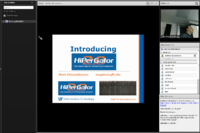
HiPerGator 2.0: Moving your research to the next generation of super computing
- Download the slides from the presentation.
- View a recording of the session
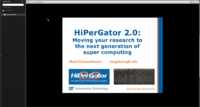
Writing SLURM Submission Scripts
- Download the slides from the presentation.
- View a recording of the session
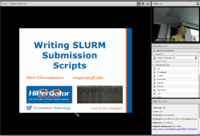
General Introduction to Research Computing and HiPerGator
UF Research Computing: An Introduction and Getting Started
This training provides a general overview of the UF Research Computing facilities and basic usage of HiPerGator. It is intended for new users.
- Download the slides from the presentation.
- View a recording of the session
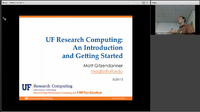
An Introduction to the Linux Command Line
This session leads participants through exercises that cover basic Linux commands such as moving around the file system, making directories, moving and copying files, etc. It also overs some of the applications you can use on your computer to connect to and move files to and from HiPerGator.
This session is largely aimed at users who are new to the command line.
- Download the slides from the presentation.
- Download the handout with the exercises
- Download an example Linux cheat sheet.
- View a recording of the session
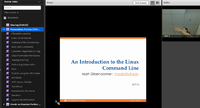
Running Jobs, Submission Scripts, Modules
This training focuses on writing job submission scripts. It covers the most common scheduler directives and how to tell the scheduler the information it needs to run your jobs efficiently.
This session assumes a basic familiarity with the Unix command line and will be aimed at beginning to intermediate users.
- Download the slides from the presentation.
- View a recording of the session
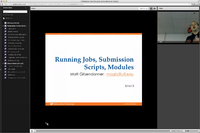
Up and Running at UF Research Computing
This session combines several the three training sessions above into one, starting with an overview of UF Research Computing, moving into a hands-on introduction to the Linux command line and walking participants through what they need to know to start running research jobs on HiPerGator.
- Download the slides from the presentation.
- Download the handout with the exercises
- Download an example Linux cheat sheet.
Storage at Research Computing
Introducing GatorBox
GatorBox is a Dropbox-like tool for file synchronization and sharing available to Research Computing users. This training introduces the tool and covers basic configuration.
- Download the slides from the presentation.
- View a recording of the session

High-Performance Data Transfer with Globus
This training introduces Globus (globus,org) a web-based high-performance data transfer tool available to Research Computing Users.
- Download the slides from the presentation.
- View a recording of the session
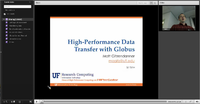
Application/Discipline Specific Trainings
Galaxy Overview: The Basics
This session focuses on Galaxy, a web-based application platform with the ambitious goal of enabling "data intensive biology for everyone." While Galaxy, and the training, are largely geared toward biology applications, Gaussian, an application for ab-initio molecular electronic structure calculations, is also available through UF Research Computing's Galaxy instance.
This training explores the range of applications available in Galaxy, looking at Blast, next generation sequence analysis, and genome visualization tools. It reviews the data sharing and workflow generation capabilities of Galaxy.
- Download the slides from the presentation.
- View a recording of the session
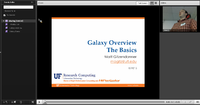
Next Generation Sequencing Data Techniques: Reference-Based Mapping and de Novo Assembly
This training focuses on Next Generation Sequencing (NGS) data. It looks at both reference-based mapping of reads (using Bowtie and Bowtie2) and de novo assembly of reads (using Velvet). I will also briefly highlight some of the other mapping and assembly applications available at Research Computing. We will use both the command line and Galaxy during the demonstration. Users are encouraged to bring their laptop and follow along with some of the analyses.
- Download the slides from the presentation.
- Download the handout with the exercises.
- View a recording of the session
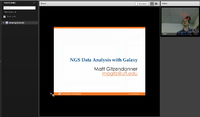
Next Generation Sequencing Data Techniques: General Methods and Tools
- Download the slides from the presentation.
- Download the handout with the exercises.
- Download the shell command log from the demo.
Phylogenetic Analyses
This training covers the basics of running phylogenetic software both in Galaxy and on the command line. We look at resource requests, especially CPU requests for MPI and threaded applications such as MrBayes and RAxML. This training assumes the user is familiar with the applications and is focussed on how to efficiently run the software on the cluster.
- Download the slides from the presentation.
- View a recording of the session
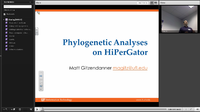
MATLAB at Research Computing: A Hands-on Tutorial to Running Your MATLAB Code at Research Computing
This training walks users through a hands-on example of using MATLAB at Research Computing. It looks at using the MATLAB GUI, compiling code and submitting MATLAB jobs to the scheduler to run on the cluster.
- Download the slides from the presentation.
- View a recording of the session
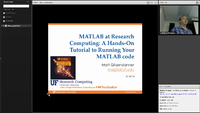
UF Research Computing: Overview and Running STATA
This training provides a general overview of Research Computing and an introduction to running STATA on the system. This is geared toward getting STATA users up and running on the cluster.
- Download the slides from the presentation.
- View a recording of the session
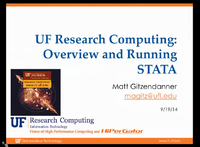
Advanced Topics
Optimizing Batch Submission and Job Performance
Going beyond the basics of running jobs, this training covers a more detailed view of the batch system resource requests and how to optimize job performance. It looks at strategies to profile application performance and tune resource requests. The session also looks at using job arrays as one way to run many similar jobs. The training assumes users are familiar with the basics of Research Computing and HiperGator, the Linux command line, and job submission.
- Download the slides from the presentation.
- View a recording of the session
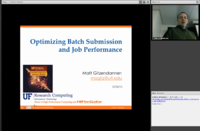
Overview of Programming tools at Research Computing
This session provides an overview of programming tools available at Research Computing, including compilers, debuggers, and performance profiling tools for serial and parallel programs. It covers the basic usage of these tools on Research Computing systems, for example, how to compile parallel programs, find memory leaks and measure performance.
- Download the slides from the presentation.
- View a recording of the session
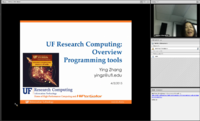
Introduction to GPUs
- Speaker: Dr. Charles Taylor
- Download the slides from the presentation.
Course Material
Orientation material for courses using Research Computing
This is the training material presented for courses that wish to use the cluster. See the details of course use of the cluster.
- Download the the slides from the presentation.
Additional Training Opportunities
In addition to the training sessions coordinated by UF Research Computing, we are aware of many training opportunities provided by other institutions and vendors. These are listed below.
NVIDIA OpenACC Online course
Register now, course starts October 1, 2015.
More Science, Less Programming
Accelerated computing is fueling some of the most exciting scientific discoveries today. For scientists and researchers seeking faster application performance, OpenACC is a directive-based programming model designed to provide a simple yet powerful approach to accelerators without significant programming effort. OpenACC also allows the same code to run on multicore CPUs and GPUs.
Join HPC industry’s OpenACC experts for a free online course. This course is comprised of four instructor-led classes that include interactive lectures, hands-on exercises, and office hours with the instructors. You’ll learn everything you need to start accelerating your code with OpenACC on GPUs and x86 CPUs. The course will cover introduction on how to parallelize, profile and optimize your code, as well as manage data movements and utilize multiple GPUs.
Intel Software Tools Technical Webinar Series
This free webinar series presents tools, tips, and techniques that will help sharpen your development skills on developing and improving your high performance compute applications for multicore and manycore on Intel® Xeon® processors and Intel® Xeon Phi™ coprocessors. Expert technical teams at Intel as well as open source innovators discuss development tools, programming models, vectorization and execution models that will get your development efforts powered up to get the best out of your applications and platforms.
Full schedule and registration information is available here.
XSEDE
The Extreme Science and Engineering Discovery Environment online training mostly lists html tutorials offered at the Cornell University. Offered tutorials cover general programming, scripting, parallel programming (concepts, message passing interface (MPI), openmp), visualisation, code improvement, and other topics.
The XSEDE Training Calendar includes many useful webcasts that are provided by a number of institutions. For most events registration is required.
TACC
Many TACC online training sessions are webcast and are listed in the XSEDE Training Calendar above. Training materials, recordings and webcasts are available from the TACC Course Materials site.